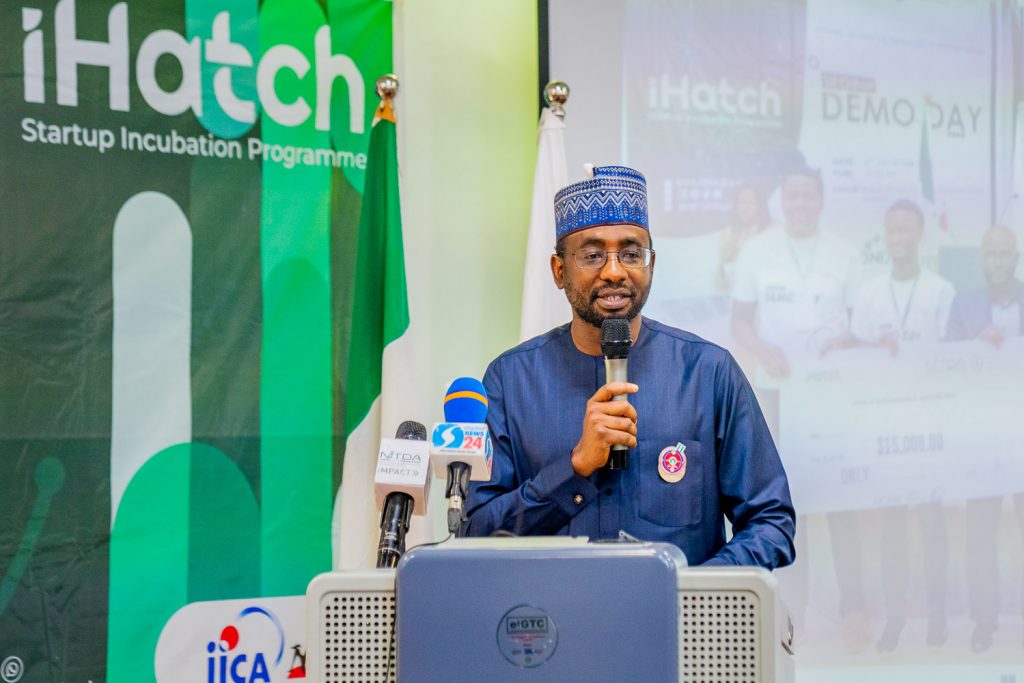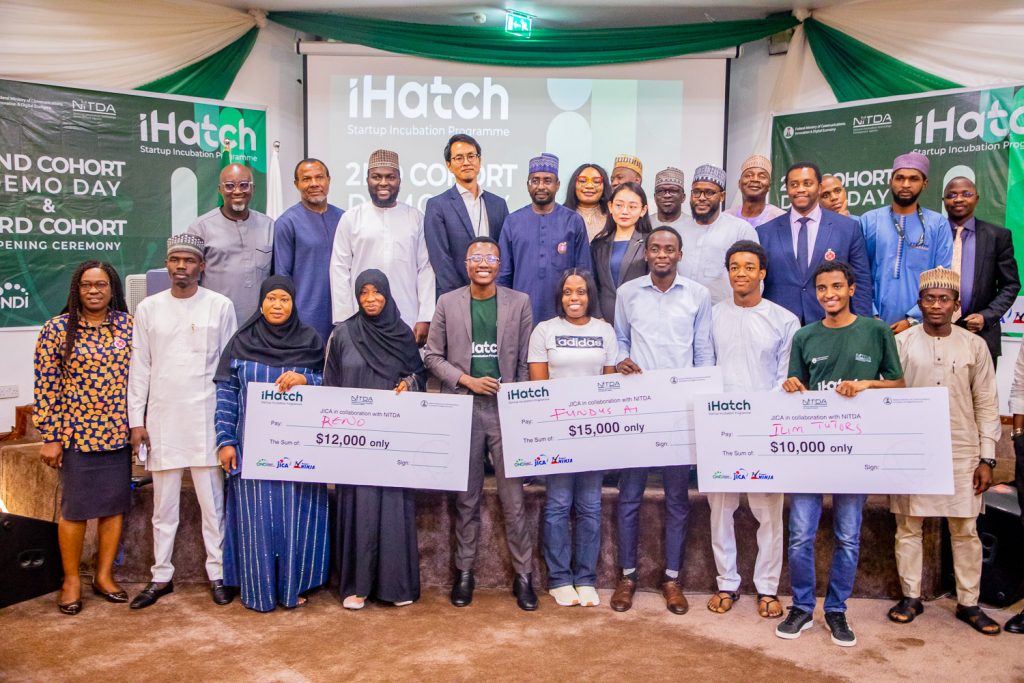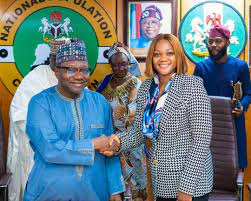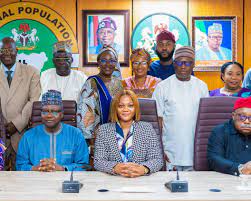Opinion
Repositioning Nigeria’s telecom sector with renewed strategy
Published
7 months agoon
AJAGBE ADEYEMI TESLIM
SPONSORED BY: H&H
The approach to repositioning Nigeria’s telecom industry to meet global standards is taking a new dimension with renewed hope as the Ministry of Communications, Innovation & Digital Economy is putting up new strategies that will enhance innovation and the digital economy. Abolaji Adebayo analyses the strategies.

Adebayo
For the progress and innovation of the sector, the Minister of Communications, Innovation and Digital Economy, Dr. ‘Bosun Tijani presented a strategic blueprint that will guide the government and other stakeholders in repositioning the industry.
According to the minister, “This document is a critical launchpad in our journey towards a Nigeria that thrives in the digital age in alignment with the Renewed Hope Agenda of President Bola Ahmed Tinubu. As we reflect on our rich history as a country and today’s dynamic challenges, our path to greatness will be forged through a clear vision, constructive collaboration, and a commitment to our common good. This strategic blueprint articulates a vision for Nigeria that builds on the transformative power of digital technology and innovation to diversify and deepen our economy.”
The sector
Though telecommunication is one of the sectors that has been growing in strength in Nigeria, its growth is still below the expectation considering the development of technology across the world.
The industry has been facing various challenges including cybersecurity and online fraud, regulatory burden, multiple taxation, vandalism of telecommunication infrastructure, right-of-way challenges, access to foreign exchange, and inter-industry indebtedness, among others. These have been the major bottlenecks hindering the progress of the sector.
For optimum performance of the sector, there is a need for the government, working in collaboration with the stakeholders, to reposition the industry hence, the creation of a roadmap to build innovation in the telecom sector and accelerate the diversification of the Nigerian economy by enhancing productivity in critical sectors through technological innovation.
Target
“In a world where digital transformation and innovation is fast becoming a catalyst for economic progress, we are at a critical moment as a nation in our journey towards a more inclusive and prosperous future. The intersection of a strong digital economy and our innovative and youthful population presents us with a unique opportunity to chart a course toward prosperity, inclusion, and global relevance.
“President Tinubu’s Renewed Hope Agenda has at its core, a recognition of the power of technology and innovation as enablers of economic growth and development. It is a call for us to take advantage of the opportunities presented to us with a spirit of determination and conviction,” the minister stated.
Strategy
To achieve the target in the economy recovery through a robust telecom and industry with innovation, the minister has set us a framework that encompasses five key pillars that include Knowledge, Policy, Infrastructure, Innovation, Entrepreneuship & Capital (IEC), and Trade.
Each pillar, according to the minister, is integral to the mission and interconnected with others, forming the foundation of the strategy.
He said: “Knowledge is the cornerstone upon which innovation thrives, and is built upon the bedrock of sound policies. Infrastructure provides the essential backbone for a thriving digital economy, while innovation and entrepreneurship drive economic
diversification. Trade, the fifth pillar, represents our commitment to global collaboration and partnerships, recognising that innovation knows no borders.
“As we embark on this transformative journey, we do so with an unwavering sense of purpose. We understand that the road ahead may be challenging, but it is through these challenges that we find the impetus to evolve and adapt. Together, we will harness the power of technology to elevate Nigeria’s standing on the global stage, create sustainable employment opportunities, and improve the quality of life for all Nigerians.
I extend an open invitation to all stakeholders, both within and outside government, to unite in this collective endeavour. It is our shared vision, ambition, and commitment that will drive us towards a Nigeria that not only embraces the digital age but leads it.
Let us rise together and seize this moment in our history to shape a future that we can all be proud of.”
Agencies
The agencies that will implement the strategies to achieve the set goals include Galaxy Backbone, which provides reliable ICT infrastructure, broadband network, database management, collaborative platforms, and related services to all government agencies to facilitate efficient e-government operations and digital transformation; National Communications Commission (NCC), established to regulate and promote investment in the telecommunications industry, ensuring fair competition among operators, consumer protection and the development of a robust and inclusive communication network; the Nigerian Communications Satellite Limited (NigComSat) operates and provides satellite communication services, supporting technological development and facilitating national and global connectivity. Nigeria Data Protection Commission (NDPC) is another agency under the Ministry that oversees the implementation of the Nigeria Data Protection Regulation towards safeguarding the rights of natural persons to data privacy, preventing manipulation of personal data, and ensuring that Nigerian businesses remain competitive in international trade; Nigerian Postal Service (NIPOST) provides efficient and affordable postal services, promotes the use of digital technology and develops new products and services aimed at increasing market share and creating new markets in the postal sector.
The National Information Technology Development Agency (NITDA) is saddled with the responsibility of developing, regulating, and promoting the technology sector by driving digital innovation, capacity/talent development, policy formulation, and public-private partnerships to ensure universal access and technological advancement; while
Universal Service Provision Fund (USPF) was set up to promote universal and affordable access to telecommunications services in underserved and unserved areas, bridging the digital divide and facilitating greater social equity and inclusion.
With all these agencies, repositioning the industry seems seamless. Stakeholders urged the government to ensure each agency is given the autonomy to do its job, saying regulatory capture as experienced during the former regime will yield no result.
An intuitive approach to increase Nigeria’s national output is to increase factor inputs (Labour and Capital) but multiple major economic theories recognise the central importance of ongoing technological progress and efficiency gains for increasing national output and income. Some of these justifications include the fundamental economic model of Cobb-Douglas Production Function which shows that improved Total Factor Productivity (TFP) directly increases output without added inputs. (Cobb & Douglas, 1928 ). Schumpeterian Growth Models also argued that sustained growth requires “creative destruction” from disruptive innovations and technologies (Schumpeter, 1942 ).
Likewise, Solow Residual Theory showed that TFP, not inputs, explained most economic growth in advanced countries, and raising TFP will increase output when capital growth slows in countries like Nigeria (Solow, 1957 ). Endogenous Growth Theory also shows that TFP is the key driver of sustained economic growth rather than just capital accumulation (Romer, 1990 ).
Similarly, a more recent New Growth Theory demonstrates that economic growth is driven by “recipe accumulation” as new ideas and technologies boost productivity i.e., policies that promote innovation and technology adoption will increase TFP and subsequently increase national income (Romer, P.M. (1990).
The pillars
As earlier explained, the strategies to reposition the sector are based on five pillars as presented by the Minister.
Knowledge
In the rapidly interconnected world, knowledge is the foundation upon which countries build a robust and sustainable economy.
“As a critical prerequisite, knowledge influences how we generate innovations and technologies that drive economic growth, expand the talent pool to drive competitiveness, improve productivity, and inform evidence-based policymaking, amongst others.
“As a Ministry, our mandate of contributing to the diversification of the Nigerian economy through enhanced technical efficiency facilitated by technological innovation rests on the effective application of knowledge. To this end, knowledge forms the critical foundation of our strategic blueprint for the next four years.”
With this strategy, the government targets to accelerate the growth of Nigeria as a global technical talent hub and net exporter of talent; deepen and accelerate Nigeria’s position in global research in key technology areas; and raise the complexity and dynamics of its economy by significantly increasing the level of digital literacy across the country.
Policy
Tijani stated that the government will come up with policies that will enable innovation, entrepreneurship, and inclusive growth.
“When properly designed and executed, the policy provides a platform for innovation and entrepreneurship to thrive. Effective policy provides regulatory clarity and necessary incentives for an environment where businesses and innovators are empowered to grow. Over the next four years, our policies will focus on encouraging investment, research and development, and the protection of intellectual property. By so doing, we will attract talent and investment to stimulate our innovation ecosystem. In addition, this pillar will prioritise the use of policy to drive universal access to the benefits of a dynamic digital economy.”
Infrastructure
On infrastructure, the government indicates its commitment to building the critical infrastructure required to power a strong digital economy, recognising that economic prosperity is linked to a robust digital foundation.
“Our emphasis on building stronger digital infrastructure extends beyond connecting people but also focuses on economic empowerment and creating opportunities for inclusion. With improved access to quality broadband, and upgraded critical services, this pillar will catalyse a digital transformation that impacts our entire population.
“We will connect communities and businesses by implementing our broadband strategy to ensure that everyone is carried along. Managing our spectrum efficiently will create pathways for the growth of new technologies and improve access to government services. Our plans for our postal service and satellite communication infrastructure re-affirm our commitment to leveraging improved digital public infrastructure to deliver inclusive economic growth for all,” Tijani said.
IEC
In the rapidly evolving global technology landscape, innovation, entrepreneurship, and access to capital are critical components of a strong digital economy. With this strategy in place, the government is providing a roadmap for Nigeria to harness the potential of these three pieces as catalysts for the transformation of the digital economy.
The strategy is said to be the driving force behind the creation of an environment that encourages innovation, supports entrepreneurship, and attracts the required capital to deliver on its ambitions.
“In this pillar, we outline a set of initiatives that recognise the importance and necessity of these 3 inputs—innovation, entrepreneurship, and capital—for delivering a vibrant and inclusive digital economy. This forward-looking approach keeps our innovation ecosystem ahead of the curve and future-proofs our economy.”
The Minister said the objective is to stimulate the growth and sustainability of startups, with a specific focus on those developing innovative solutions for critical sectors in the economy.
Trade
By Trade as a strategy, the federal government is showing commitment to position Nigeria as a major player in the African and global technology ecosystem. As a rapidly growing economy, with the ICT sector contributing 18.44% to Nigeria’s GDP in Q2 2022, and e-commerce spending projected to grow to $75 billion by 2025 (Statista), the primary goal is to enhance Nigeria’s participation in the global technology trade over the next four years.
“A core part of this pillar is our aim to improve Nigeria’s ranking in the ECI (Economic Complexity Index) Technology Index. This pillar articulates our plan to leverage technology trade as a catalyst for economic growth and collective regional prosperity. Through deliberate partnerships, novel trade policies, and investments, we will strengthen our position as a top technology centre that provides strong leadership in defining Africa’s digital future.”
Last line
While it is believed to be the right approach to reposition the telecom industry, stakeholders harp on strict implementation to achieve the target goals.
Culled from New Telegraph
You may like
Opinion
IHATCH: JAPAN GOVERNMENT TASK TO LEVERAGE NIGERIA’S YOUTHFUL POPULATION- DG NITDA
Published
5 months agoon
December 3, 2023
By James Ishaku
As part of the current administration of President Bola Tinubu’s commitment towards creating meaningful opportunities for Nigerian youths, the Director General Of the National Information Technology Development Agency (NITDA), Kashifu Inuwa CCIE has called on the government of Japan to leverage on the youthful population through strategic talent partnership that will nurture and build a workforce that can be exported.
The DG made the call at the Ihatch startup incubation programme 2nd cohort demo day and 3rd cohort opening ceremony organised by the subsidiary of the agency, Office for Nigerian Digital Innovation (ONDI), in partnership with Japan International Corporation Agency (JICA) in Abuja.
Inuwa noted that the ihatch 5-month free intensive incubation programme executed by the ONDI and hosted within the National Centre for Artificial Intelligence and Robotics (NCAIR) is designed to help Nigerian tech entrepreneurs refine their business ideas through a series of coaching, lectures, and booth camps to develop scalable and adaptable business models that willfocus on youth, innovation, entrepreneurship, and technology.
He added that the incubation programme will be held simultaneously in Abuja, Lagos, Port Harcourt, Gombe, and Kano and JICA has agreed to extend the Fourth Cohort across each of the 36 States and the FCT. This is to enable wider reach and to stimulate the startup ecosystems across the States.
The DG stated that not fewer than 1,218 applications were received for the Second Cohort and the number was pruned down to 8 startups, comprising 16 persons, a Founder and Co-Founder for each startup, after undergoing levels of rigorous selection process conducted by a panel of judges, comprising experts in diverse areas of technology and innovative entrepreneurship.
He explained that the selection process assessed the startups’ ideas based on the criteria of profitability, scalability, social impact, idea technique, competitive advantage, experience, and a clearly defined future roadmap.
Inuwa further revealed that a total of 11,183 applications were received from across the 6 geopolitical zones for the Third Cohort. This culminated in the selection of the top 8 startups, comprising 16 founders in total that will participate in the Third Cohort that was launched.
He added that 16 startups that participated in the first and second cohorts of the iHatch incubation programme have moved on to achieve remarkable success in the areas of job creation, funding, participation in events, and valuable partnerships which have created a combined total of 179 direct jobs in the span of agriculture, health, education, and e-commerce sectors.
The DG further asserted that apart from the total grant of US$45,000 (US$15,000 each) for Proof of Concept (POC) to the top 3 startups in the first cohort, some of the startups have raised some funding through other sources. Xolani Health (a health tech startup from the first cohort) secured a grant worth US$155,000, BetaLife (a health tech startup from the first cohort) secured an angel investment of US$60,000, Gifty (an e-commerce startup from the second cohort) got a grant of USD$8,000 while two other startups from the first and second cohorts respectively, raised a combined total grant of US$6,000.
Inuwa affirmed the agency’s commitment to working with relevant stakeholders and partners towards the successful implementation of the Nigeria Startup Act (NSA) which will accelerate innovation and provide much-needed jobs for our teeming youths. Leaving nothing to chance in our resolve to nurture the entrepreneurial spirit in our youth to catalyze the Nigerian digital economy to the next level.
The Honourable Minister, Federal Ministry of Industry, Trade and Investment, Doris Nkiruka Uzoka-Anite, represented by National Coordinator, National Talent Export Programme, Dr Femi Adeluyi, applauded NITDA for the various initiatives and programs put in place for the advancement of the tech ecosystem in the country.
Anite noted that the NITDA DG at the Digital Nigeria International Conference 2023 edition harped on the need for Nigeria to become the talent destination of the world where countries will come to seek a workforce that will work with them towards achieving their goals and objectives.
She added that “technology is a pivotal tool in all aspects of life which cannot be overemphasized and the green transition scoreboard global total has reached about $7.13 trillion for export and about $6.6 trillion for importation, the important aspect is that 54% of these activities is digitally edible and prepares people to be effective and efficient in the different sector of the economy is laudable”.
The Minister also appreciated JICA for its relentless efforts toward the advancement of the tech ecosystem in the area of automobile, development, training, scholarships, interventions and a lot more which has impacted the citizens directly or indirectly.
The Ambassador of Japan to Nigeria, Matsunaga Kazuyoshi, represented by Yuzurio Susumu Chief of Nigeria Office in his remarks stated that Nigeria is the most popular country in Africa and the heart hub of entrepreneurship activities aimed towards the advancement of the country.
He added, “With all the challenges faced by insecurity, and limited infrastructures in the country, Nigerian startups are demonstrating remarkable creativity and resilience in developing solutions that other critical social issues in areas such as education, transportation, healthcare and finance”.
He added that the present administration has identified the transformation potential of startups and digitization making it a key factor in diversifying the Nigerian economy from its dependence on oil.
The Ambassador pointed out that startups are seen as a catalyst for business transformation, bringing fresh ideas, innovative technologies and new employment opportunities. Japan has the longest history of technological innovation and entrepreneurship has a significant role in supporting the Nigerian system.
Among those who attended were representatives from both the private and public and the top three (3) startups emerged with cash prices to Fundus AI 1st postion $15,000.00, Reno 2nd postion with $12,000.00 and Ilim Tutors 3rd postion $10,000.00 respectively.
Coker – Odusote: 100 Days at the Helm of NIMC
By Walter Duru, Ph.D
It was Albert Einstein that once said that “setting an example is not the main means of influencing another, it is the only means.” That sentiment expressed by Einstein is the primary essence behind the theory of transformational leadership, which requires passion, charisma, and the ability to motivate others. Transformational leaders are usually very authentic, emotionally intelligent, great listeners, results-focused, visionary, and self-aware.
In just 100 days at the helm of the National Identity Management Commission (NIMC), Engr. Abisoye Coker-Odusote has ushered in a new era of transformational leadership, leaving an indelible mark on the organization. Her eventual confirmation as substantive Director General/Chief Executive Officer of the Commission did not come to many as a surprise.
She did not waste time to hit the ground running and showed commitment to advancing the NIMC’s mission and mandate.
Coker-Odusote has taken steps to streamline National Identity Number (NIN) registration processes, while addressing the long-standing challenges associated with identity registration in Nigeria. This, she is handling through strategic restructuring and the integration of advanced technologies with a view to significantly reduce waiting time and enhance the overall efficiency of the system.
Today, date of birth and other kinds of modifications at NIMC happen within 48 hours. The several years backlog of date of birth modifications she inherited are almost cleared, as she had given a one-month deadline for the same to relevant staff of the Commission.
Again, responses to issues and complaints, such as those whose National Identity Numbers did not hit the NIN Verification Portal are now resolved within 24 hours.
Recognizing the paramount importance of data security in the digital age, the NIMC CEO has taken steps to enhance data security by introducing robust measures to fortify the protection of citizens’ sensitive information. This includes, but not limited to the adoption of cutting-edge encryption technologies and the establishment of a dedicated cybersecurity team.
Her interest in improving service delivery at NIMC cannot be overemphasized. She has concluded plans to ensure regular training and retraining for staff of the Commission, emphasizing customer-centric approaches, to ensure a more positive experience for citizens seeking identity services.
On partnerships, Coker-Odusote, leveraging her extensive network and expertise, has forged strategic partnerships with governmental agencies, private organizations, and international bodies. These collaborations aim to enhance the NIMC’s capacity, foster innovation, and promote information sharing for the betterment of identity management.
Understanding the pivotal role of technology in modernizing identity management, Engr. Coker-Odusote has spearheaded the integration of biometric advancements and artificial intelligence into the registration and verification processes.
This not only improves accuracy, user experience and ease of enrolment, but also positions NIMC at the forefront of technological innovation in identity management. A typical example is the NIMC Contactless Biometric Solution, which delivers a best-in-class fingerprint and facial capture image output quality, powered by Artificial Intelligence. The new solution was unveiled by the commission at the 2023 Identity Day, held in Abuja on September 16, 2023.
In addition, Engr. Coker-Odusote tackled the existing backlog of unprocessed identity requests head-on. Through a combination of strategic staff deployment and redeployment, process optimization, and digitization initiatives, she has made significant strides in clearing the backlog, demonstrating her commitment to prompt and efficient service delivery.
Recognizing the crucial role played by the NIMC staff in achieving organizational goals, the CEO has developed for implementation, a robust welfare programme aimed at boosting morale and fostering a positive work environment. This includes, but not limited to training opportunities, health benefits, and performance recognition initiatives.
Furthermore, in consultation with in-house experts, elaborate public awareness campaigns are being planned, to ensure that citizens are well-informed about the importance and benefits of identity registration. These campaigns are expected to not only educate the public, but also serve to demystify the registration process, encouraging greater participation.
The NIMC DG has concluded plans to take the ecosystem enrolment forward by taking steps to deepen collaboration with ecosystem implementing partners, supporting to ensure the success and optimal performance of the Nigeria Digital Identification for Development (ID4D) Project, a Nigerian Project jointly funded by The World Bank, The European Investment Bank, and the French Development Agency.
Engr. Coker-Odusote’s strategic vision, commitment to efficiency, and emphasis on technological innovation positions NIMC for a future where identity management is not only secure but also seamlessly integrated into the daily lives of citizens.
On anti-corruption, the NIMC DG has left no one in doubt on her determination to sanitize the system, entrench a culture of transparency and zero tolerance for corruption. Apart from putting systems and structures in place to discourage graft, she is directly involved in ensuring that the cankerworm has no place in the commission.
Just recently, in what one may describe as a sting operation, she paid an unscheduled visit to the Federal Capital Territory office of the commission, where she is reported to have arrested some staff for allegedly extorting money from Nigerians, even as she has maintained that enrolment was free.
Her devotion to supporting the policy direction of the present administration by strengthening the issuance of the NIN for access to service is not in doubt.
Speaking on Coker-Odusote’s first 100 days in office as NIMC CEO, Project Coordinator, Nigeria Digital ID4D Project, Musa Odole Solomon described her as a vibrant, results-focused leader, determined to make a difference in the Commission.
“She has taken steps to build bridges of collaboration between NIMC and partners within the country’s identity ecosystem. These collaborations aim to enhance the NIMC’s capacity, foster innovation, and promote information sharing for the betterment of identity management in Nigeria.”
“The collaboration is also focused on enhancing handshake with institutions involved in the country’s identity ecosystem, with a view to deepening integration with the country’s Identity Management System.”
“In 100 days, she has taken the lead in working with the Nigeria Digital ID4D Project to speed up project implementation process, especially, processes geared towards the extension of NIN enrolment to hard-to-reach areas, women, persons with disabilities, and marginalized groups, thereby fostering inclusion and access to social services.”
“She has introduced some innovations that I consider very progressive, and things are moving very well. The Nigeria Digital ID4D Project is happy to work with her, as she has shown that she has all it takes to assist us succeed.”
Responding to a question on his impression about the NIMC DG’s leadership style and the future of the relationship between NIMC and his organisation, Chairman, National Population Commission (NPC), Hon. Nasir Isa Kwarra stressed that the relationship between NIMC and NPC has become more robust under Coker-Odusote’s leadership as NIMC CEO.
“I want to say that the National Population Commission has a long and robust collaborative partnership with the National Identity Management Commission (NIMC) in our efforts to harmonize and integrate biometric databases for planning and development of our country.”
“However, this partnership has become more dynamic and robust with the assumption into office of Engr. Abisoye Coker-Odusote as the Director General of NIMC. She has shown an unparalleled commitment and passion in working with the Commission, not only in registration of births and deaths, but also the upcoming population census. She comes across as a thoroughbred professional and innovator who will give Africa’s greatest nation a deserved identity profile for national unity, security, and development. I am more confident in the future of the Identity Management Commission under her.”
Responding to a question on the new grounds covered at the NIMC ICT, Director, IT/Identity Database of the Commission, Chuks Onyepunuka has this to say:
“Our DG is pragmatic, proactive, result-oriented and visionist. Her achievements in ICT in NIMC in the last 100 days include, but not limited to: “launching of self-modification and enrolments services to ease and simplify the processes for enrolment services; driving the clearing of about 3 million backlog of enrolment records awaiting manual adjudication within 3 weeks; decentralization of operations with objectives of ensuring that we are closer to the enrolees and adequate coverage in the nooks and crannies of the country.”
“Others are improvement in the process of engaging and revalidating our Frontend Enrolment Partners (FEPs); improvement in our ICT policies, processes and procedures; resolution of 95% challenges/issues affecting our window enrolment software (Res-Web) and commenced the integration and harmonization with National Population Commission, Nigeria Immigration Service and Federal Inland Revenue Service (FIRS).”
Adding her voice, NIMC’s Director, Business Development and Commercial Services, Mrs. Carolyn Folami described the DG as a thoroughbred professional, committed to resetting the Commission for the good of the nation.
“It has been only 100 days, but it seems she has been here far longer, as within this period, we have achieved a couple of goals towards resetting the NIMC agenda and resettling the NIMC staff for productivity.”
“Starting with the planning and commencement of training of all staff, to the commitment to all Front-End Partners (FEP) to revalidate the business model for fair play and payment. She is very keen on stakeholder engagement and has secured the buy- in of our harmonisation partners for effectiveness. She is professional, thorough, dedicated, and above all, kind to all.
Adding his voice, Monitoring and Evaluation Specialist, Project Implementation Unit, Nigeria Digital ID4D Project, Dr. Emmanuel Akogun argued that Coker-Odusote’s first 100 days in office were characterised by “dynamic, focused and results – oriented leadership,” adding that there is steady progress in NIN enrolment, with “103,500,000 Nigerians and other legal residents captured in the NIMC Database.”
There is therefore no gainsaying the fact that Engr. Abisoye Coker-Odusote’s first 100 days as CEO of the NIMC have been marked by a series of commendable achievements.
At this point, one can confidently say that with Engr. Bisoye Coker-Odusote as Chief Executive Officer, NIMC is in safe hands.
Her recent confirmation as substantive Director General/CEO of the Commission is clearly an act of patriotism by the Nigerian President, Bola Ahmed Tinubu.
However, as she commences a full tenure of office, following her recent confirmation, one expects that the standard is not lowered.
As she marks 100 days in office this week, the most challenging part of Abisoye Coker-Odusote’s journey as Chief Executive Officer of the NIMC is the need to sustain the successes recorded, remain focused, deepen stakeholder engagement and public enlightenment, check corruption, strengthen systems and structures, be fair to all, while supporting the policy direction of the present administration.
Deliberate steps must be taken to ensure the sustenance of the war against extortion at NIMC.
Again, a deliberate plan should be in place to ensure a more robust stakeholder collaboration, particularly with those involved in the country’s identity ecosystem.
Elaborate, sustained communication and public enlightenment activities are required, taking advantage of the conventional and unconventional channels of communication to inform, educate and mobilize the citizens on the need for all to register for the NIN. This requires a deliberate strategy and strategic implementation.
Finally, a deliberate inclusion strategy must be in place and vigorously implemented to ensure that no one is left behind.
As the DG continues to lead with passion and purpose, NIMC is poised for even greater accomplishments under her guidance.
Indeed, NIMC is in safe hands!
Dr. Walter Duru (Assistant Professor of Communication and Multimedia Design) is a Communication/Public Relations Strategist, Researcher and Consultant. He could be reached on walterchike@gmail.com
Opinion
Telecoms: Operators seek strict harmonised RoW charges
Published
5 months agoon
November 25, 2023AJAGBE ADEYEMI TESLIM
SPONSORED BY: H&H
Telecom operators have urged the federal government to make a policy that will make the charges on the Right of Way (RoW) uniform across the country.
According to them, the issue of RoW has been a major challenge hindering the deployment of telecom infrastructure while the infrastructure is vandalised in some areas.
Right of Way charge is a levy paid by telecommunication companies to state governments, permitting telecommunication companies to dig up the roads and install telecommunications hardware such as optic fibre cables that carry internet traffic.
The Right of Way charge has been fraught with inconsistencies across the states in terms of charges and has negatively impacted broadband infrastructure.
To harmonize the Right of Way charges for broadband infrastructure investment, the Federal Government, in 2017, through the National Executive Council (NEC), approved a policy, which resulted in a RoW Charge Agreement reached with all the governors of the 36 states of Nigeria.
However, the RoW Charge Agreement is yet to be fully adopted by the 36 States, and in recognition of the slow uptake by the States, the former Minister of Communication and Digital Economy, Isa Pantami, on January 14 2020 in a press statement called on states to implement the harmonization of the RoW charges for obvious benefits for the sector such as deepening development/growth in broadband infrastructure, and reducing the transfer of RoW charges costs by telecommunications companies to customers.
January 2020 recorded a step in the right direction when the Nigerian Governors Forum accordingly resolved that telecommunication operators were to pay N145 (approximately $0.37) per linear metre to lay fibre cable anywhere in the country.
Meanwhile, despite these, the telecom operators have continually complained about the different charges leveled by different states for the Right of Way.
According to them, the issue of the RoW has been worrisome affecting the laying of telecom infrastructure in some states in the country.
They said this has also been the bane of telecom services in some areas, especially in the cities where people do not enjoy the services.
The operators noted that if there is harmonisation and every state in the country abides by the rule, telecom services will be everywhere across the country.
“If such policy is wrong and strict, there will be unification in the charges for the Right of Way by all the states. And even the payment will be easy. And to make the policy strong, the Federal Government must declare telecom infrastructure as national infrastructure.
Once it becomes a national infrastructure, you don’t need to talk about being paid or not being paid.
All that the telco company needs to do is to pass through the agency that is in charge. You write the agency and get your cables laid.
Except the Right of Way affects someone’s building, which is very difficult. If it affects someone’s building, that is a different thing, but if it does not, what you just need is to get approval from the agency in charge. If this is achieved, the broadband penetration we are talking about will be easily expanded,” telco operators said.
Trending
-

 News5 years ago
News5 years agoBreaking: ‘Penalty’ Crooner Small Doctor Caught in Possession of Fire Arms
-

 News5 years ago
News5 years agoTiffany Trump Is Dating a Millionaire Michael Boulos From Nigeria
-

 News5 years ago
News5 years agoPDP Set To Cause Panic Days To Polls: FG
-

 News5 years ago
News5 years agoINEC Engages EFCC, FIU In Tracking Campaign Funding
-
News2 years ago
INEC Publish Final List of Candidates For 2022 Osun Governorship Poll
-

 Politics5 years ago
Politics5 years agoPDP Alleges Plot by APC, Presidency to Detain Its Leaders
-

 Politics5 years ago
Politics5 years agoOsinbajo Has Betrayed Yorubas, Says Afenifere
-

 Politics5 years ago
Politics5 years agoLagos Commissioner Decamps To PDP










